
CONTACTAbout UsCAREER OPPORTUNITIESADVERTISE WITH USPRIVACY POLICYPRIVACY PREFERENCESTERMS OF USELEGAL NOTICE
© 2025 Equal Entertainment LLC.
All Rights reserved
All Rights reserved
By continuing to use our site, you agree to our Privacy Policy and Terms of Use.
We need your help
Your support makes The Advocate's original LGBTQ+ reporting possible. Become a member today to help us continue this work.
Your support makes The Advocate's original LGBTQ+ reporting possible. Become a member today to help us continue this work.
When Polly Pagenhart's partner, Jennifer, became pregnant with their first child, the couple began a process that is as common to most same-sex parents as painting the nursery or packing the hospital bag: deciding what their child would call each of them. For Pagenhart, now 50, who describes herself as butch and gender-nonconforming, this was not an easy task.
"I was stumped," she explains. "I felt like I couldn't be a parent if I had to be a conventionally feminine mother. I couldn't even accept a variation on the word 'mother' for my title."
After exploring various parental titles, Pagenhart decided on the title "baba," the diminutive for "father" in Frankfurter, a German dialect. The more she researched the term, the more she discovered that it had meanings in many cultures denoting a warm, loving caregiver or protector. She claimed the title and never looked back. Now, eight years later, she is the proud "baba" of two children as well as the author of Lesbian Dad, a parenting blog about her experiences navigating the murky territory between motherhood and fatherhood.
"What I think is most important is that there is cultural space for gender-nonconforming people to be parents and still be who they are on the spectrum of gender," explains Pagenhart. "For some women, myself included, the word 'mother' just couldn't ever fit comfortably, even with a modifier. 'Parent' is what I am most unequivocally."
Pagenhart, as it turns out, is not alone in her decision to carve out a space for herself within the traditional turf of fatherhood. As more gay and lesbian couples become parents, nontraditional families and lesbian dads along with them are more visible in society than ever before.
"This phenomenon exists," explains Abbie Goldberg, author of Lesbian and Gay Parents and Their Children: Research on the Family Life Cycle and one of the nation's leading researchers on LGBT parenting. "I'm sure that each lesbian dad might define their role and identity somewhat differently, but my sense of the term is that it is used to describe lesbian parents who feel like the culturally accepted identity and role of father is more in line with her own parental identity and role than the culturally accepted identity and role of mother. From researching lesbian and gay parents who vary to some degree in their own gender identity and gender expression, I'd say that lesbian dads typically are more male-identified, in the sense that they present and identify with a more masculine or gender-neutral/ambiguous/queer role than a feminine role."
Although the realm of lesbian fatherhood is still being pioneered, lesbian dads most often identify as butch or genderqueer and are usually the nonbiological parent in their partnership. While some stick to being called "mom" or "mama," many embrace alternative titles ranging from "baba" to "papa" to the old standards "dad" or "daddy."
For Jess Burgan, 30, who identifies as queer, the title of "dad" seemed the obvious choice. Uncomfortable with "mom" or "mommy" and equally ill at ease with the idea of claiming a name with a cultural root that was not relevant to her background, Burgan credits her partner, Sandra, with giving her the support she needed to claim the title of "dad."
"The biggest factor was hands down Sandra's support," says Burgan, who is currently raising two children with her partner in the Philadelphia area. "When I sheepishly threw out the idea of 'just being a dad,' her immediate response was 'of course.' The fact that it clicked so immediately and Sandra embraced it so naturally made me wonder why we had spent time thinking about anything else."
Kris Quinones, 47, a fire captain in San Diego and parent to 6-year-old twin boys, is a self-identified lesbian dad who decided to stick with the title "mama."
"I never really considered any other kind of names," comments Quinones. "It's funny, though, in my travels, most of the 'daddy mamas' are named 'mama' and the more feminine women are 'mommy.' In my [circle of] friends, the parents that are a little bit more 'on the floor with the kids' tend to be 'mama,' and I find that very interesting."
Goldberg understands why some lesbian couples place such importance on finding a parental moniker that feels right to them.

Polly Pagenhart plays with her two children in San Francisco.
"Names serve to communicate something about one's identity, one's role, and one's gender, to some extent," she says. "In turn, it feels uncomfortable for some lesbians who are more male-identified to have their children call them 'mom' because this does not match their own gender identity, presentation, and the way they see their parental role."
For Pagenhart, the process of choosing a name was primarily about creating a name for herself that wasn't "mom" or "dad" but something else entirely. "I wanted to come up with a third-gender name more so than a male-gendered name because I felt like what I needed personally was the richness of the space in between or the overlap between mother and father, although I feel like socially speaking, I'm primarily a dad, relative to our kids," she explains. "For me, it's sketching that space in between mother and father and getting to something that's not binary. I think for me, that's when I'll feel the most liberated."
It is impossible not to look at the concept of the lesbian dad without considering the ways in which society's understanding of fatherhood is changing. Modern heterosexual fathers are more active in their children's lives than ever before, embracing baby-wearing and diaper-changing, and sometimes leaving their professions to stay at home with the kids. It is this cultural flux and blurring of gender roles that is opening space for all sorts of nontraditional parenting roles, including lesbian dads, to exist. The concept of equally shared parenting, a model in which both parents contribute equally to household chores, breadwinning, and child-rearing, is being embraced by many heterosexual couples, although it might not be quite as new a concept to same-sex couples in which gender roles have never been quite as clear-cut.
"What's important to note here is that lesbian couples in general share child care, housework, and paid work more equally than heterosexual couples," explains Goldberg. "So it would be inappropriate to assume that lesbian dads are assuming an identical role or behaviors to a typical heterosexual father, whatever that might be. Lesbian dads might, for example, feel more excited about and energized by engaging in stereotypical fathering behaviors, such as play or roughhousing, but they probably do plenty of the more stereotypical feminine parenting behaviors as well, such as feeding or clothing--in part because lesbian parents tend to divide things more equally. But of course, there's probably a great deal of variability within this group."
In the Quinones home, Kris and her wife, Leslie, divide tasks based on preference. "In our home, roles are established based on what we prefer to do," says Quinones. "The roles I have aren't necessarily the father's roles--for example, my duties are dishes and kitchen, and Leslie's are laundry and keeping the carpets nice. But when we go to do stuff outside of the house, I'm definitely the let's-wrestle-on-the-ground parent. I'm not the provider, because we both work, but I'm the person who makes more money, and I do the dude roles. I fix things. I take things apart and have the boys work on them. I take the boys everywhere, as far as the beach and whatnot."
Quinones's parenting experience is unusual because, unlike most lesbian dads, she gave birth to her sons. Although she never quite pictured herself becoming pregnant because she feared it would cause her to "sit down" and take a break from her active lifestyle, she was determined to have children and suffered through years of failed attempts before successfully becoming pregnant with the twins. She has special insight into what it feels like to be part mom and part dad.
"It's weird because sometimes I don't consider myself the mom," she muses. "I consider myself the person who had the babies, and then sometimes I'm the dad because of all the things I do with them. But internally, there's still that motherly instinct where we go out and I always want to, like, rub their heads and have them real close to me and have people say that these are my sons."
Pagenhart argues that it is this blend of momness and dadness that make lesbian dads so attractive to the people that matter most--children. In her opinion, children are drawn to lesbian dads because they provide a certain open-gendered freedom that feels comfortable.
"There's a tenderness that butch women have that I find really compelling, and it is how we do our fatherhood, to the extent that it is a fatherhood," she explains. "I really think that kids sense that there is a person there who is both boy and girl and that speaks to them [because] young people are basically more 'both/and' until they get to preteen age anyway."
With lesbian fathers continuing to carve out space for themselves within the blogosphere and playgrounds across the country, the question remains how this new species of parent will be treated as they come out of the parental closet. Goldberg, author of the new book Gay Dads: Transitions to Adoptive Fatherhood, says it is a topic that begs to be handled delicately. She notes that there is not a lot of cultural support for these parents, not from LGBT people or the largely heterosexual mommy/daddy-blogger community.
"There is just not a lot of understanding of the fact that gender is really complicated and gender identity is complicated, and you can be a woman but maybe also not be comfortable with the idea of being called 'mother,' " she explains. "These are new questions and we are just getting to the point where people are saying, 'OK, two moms. I can accept that.' And so to introduce this twist [is complicated]."
Pagenhart disagrees, explaining that her greatest allies have been, surprisingly, the heterosexual daddy-bloggers she has encountered both online and at blogging conferences. In 2011 Lesbian Dad was named one of Top 50 Dad Blogs by Babbles.com, and in 2012 she was invited to moderate a panel at the Dad 2.0 Summit, an annual social media conference that explores the changing face of fatherhood.
"I have been really amazed at the enthusiasm with which my writing and my articulation of the parenting space between mother and father has been received by dudes," says Pagenhart, who's also editor in chief of the blog Lesbian Family. "I mean, it's like dude nation [in the dad blogosphere.] A lot of the men who write parenting blogs, they are like scruffy, bearded, beer-swilling guys. And dude after dude that I've met in this dad-blogging sphere, they completely get it. It was unexpected on my part, but they are thrilled to find somebody who understands their experiences as emoting, sensitive, caregiving people who didn't give birth to the child."
Burgan adds that the best response to her identity as a lesbian dad has been, well, no response at all. "The truth is I'm not looking for any special kind of response. For me, a positive response is a neutral response, one that would mirror any other introduction of a dad. My family was caught off guard a bit by the title, but everyone is on board as can be now and it feels great," she says.
Pagenhart summarizes this sentiment in simple terms: "More people are for you than you know, and it's all about love."
Abby Dorsey is a writer living in San Diego. She is currently working on her first young adult novel, The Kingdom of Presley Ross.
From our Sponsors
Most Popular
Bizarre Epstein files reference to Trump, Putin, and oral sex with ‘Bubba’ draws scrutiny in Congress
November 14 2025 4:08 PM
True
Jeffrey Epstein’s brother says the ‘Bubba’ mentioned in Trump oral sex email is not Bill Clinton
November 16 2025 9:15 AM
True
Watch Now: Pride Today
Latest Stories
California hospital will continue youth gender-affirming care after families protest
December 17 2025 11:18 AM
Tennessee whistleblower says library board chair sought private data as part of state's book purge
December 17 2025 7:00 AM
Lesbian federal worker pleads for answers about wife trapped in immigration detention limbo
December 16 2025 5:08 PM
Michigan Republican U.S. Senate candidate Mike Rogers surrounds himself with hardcore LGBTQ+ rights opponents
December 16 2025 2:53 PM
True
Florida city installs Pride bike racks after being forced to remove rainbow crosswalks
December 16 2025 2:21 PM
Ariana Grande and Jonathan Bailey in talks to star in West End musical
December 16 2025 12:26 PM
Netflix's 'Boots' is canceled: Stars react to the heartbreaking news
December 16 2025 11:37 AM
How this Minnesota city redefined LGBTQ+ rights 50 years ago
December 16 2025 11:25 AM
Gen Z women are more likely to identify as bisexual but still embrace lesbian label: study
December 16 2025 11:10 AM





























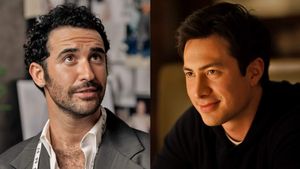









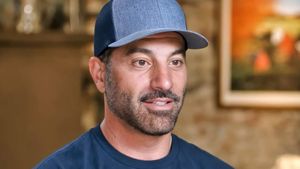




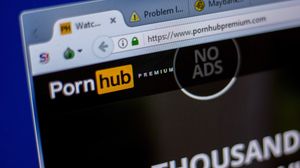

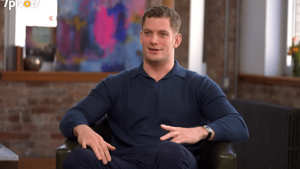





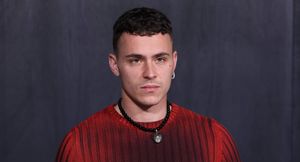






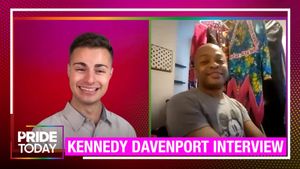





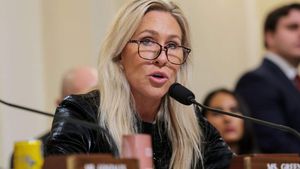

Charlie Kirk DID say stoning gay people was the 'perfect law' — and these other heinous quotes